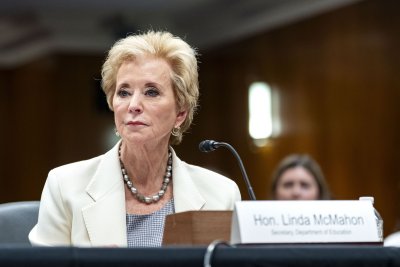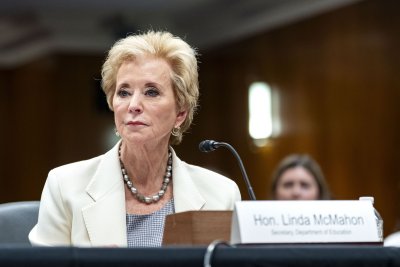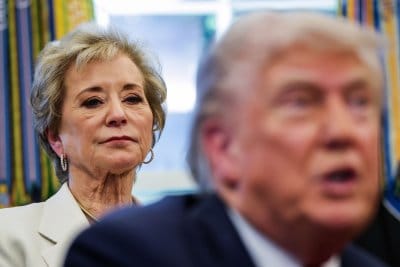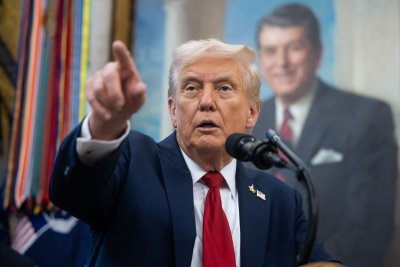Cornell reaches $60M deal with Trump administration to restore funds
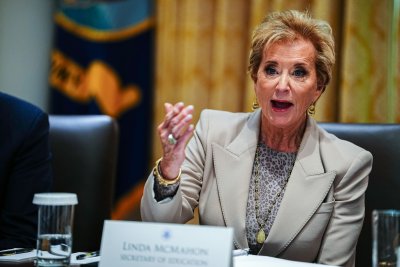
Nov. 7 (UPI) — Cornell University on Friday reached an agreement with the Trump administration to allocate $60 million that would end government investigations and restore several hundred million dollars in research funding for the private school.
Cornell has now joined four other elite universities in making deals.
The allegations stem from accusations of anti-Semitism and admissions discrimination. Cornell, located in Ithaca, N.Y., settled after Brown University, Columbia University, the University of Pennsylvania and the University of Virginia.
Cornell reached the deal with the Department of Justice, Department of Education and Department of Health and Human Services that “will protect Cornell’s students from violations of federal civil rights laws, including from discrimination based on race, sex, or national origin, and promote America’s hardworking farming and rural communities,” according to a DOJ news release.
The Ivy League school agreed to pay a $30 million fine and to invest another $30 million for programs to improve efficiency and lower costs in agriculture and farming. Cornell is a land-grant school that conducts agricultural research. The money will be spread out over three years.
The Trump administration froze more than $1 billion in research funding at the school.
Cornell’s president, Michael Kotlikoff, during his State of the University address in September, said officials didn’t know how the government reached that figure.
He said Cornell had accounted for “nearly $250 million in canceled or unpaid research funds.”
Kotlikoff had said he didn’t want the government to “dictate our institution’s policies.”
“The months of stop-work orders, grant terminations and funding freezes have stalled cutting-edge research, upended lives and careers, and threatened the future of academic programs at Cornell,” he said in a statement to the Cornell community.
“With this resolution. Cornell looks forward to resuming the long and fruitful partnership with the federal government that has yielded, for so many years, so much progress and well-being for our nation and our world.”
The five-page document reads: “This agreement is not an admission in whole or in part by either party. Cornell denies liability with respect to the subject matter of the Investigations.” The deal goes through Dec. 31, 2028.
“Both parties affirm the importance of and their support for academic freedom,” the agreement said. “The United States does not aim to dictate the content of academic speech or curricula, and no provision of this agreement, individually or taken together, shall be construed as giving the United States authority to dictate the content of academic speech or curricula.”
In the agreement, the school and government “affirm the importance of and their support for civil rights, and Cornell has a “commitment to complying with federal civil rights laws and agrees to include the Department of Justice’s ‘Guidance for Recipients of Federal Funding Regarding Unlawful Discrimination.”
Cornell agreed to provide discrimination training to faculty and staff members.
“The Trump administration has secured another transformative commitment from an Ivy League institution to end divisive DEl policies,” Secretary of Education Linda McMahon said.
“Thanks to this deal with Cornell and the ongoing work of DOJ, HHS, and the team at ED, U.S. universities are refocusing their attention on merit, rigor, and truth seeking — not ideology. These reforms are a huge win in the fight to restore excellence to American higher education and make our schools the greatest in the world.”
Attorney General Pam Bondi also praised the deal, saying, “Recipients of federal funding must fully adhere to federal civil rights laws and ensure that harmful DEI policies [diversity, equity and inclusion] do not discriminate against students.
“Today’s deal is a positive outcome that illustrates the value of universities working with this administration — we are grateful to Cornell for working toward this agreement.”
“The Trump Administration is actively dismantling the ability of elite universities to discriminate based on race or religion,” HHS Secretary Robert F. Kennedy Jr. said. “The DOJ’s agreement with Cornell strengthens protections for students against anti-Semitism and all other forms of discrimination.”
The investigations into Cornell centered on campus demonstrations against Israel in the war with Hamas that began on Oct. 7, 2023, and demands to diversify from weapons manufacturers that supplied the Israeli military.
McMahon had said the protests “severely disrupted campus life” and Jewish students were fearful on campus.
Despite a nearly $12 billion endowment, university officials warned about layoffs and “a comprehensive review of programs and head count across the university.”
In the other deals, Penn and Virginia had no financial penalties, while Columbia agreed to a $200 million fine and Brown committed to spend $50 million on workforce development programs.
Harvard hasn’t reached a deal and individually sued in April. The federal government said it would freeze more than $2.2 billion in grants and $60 million in contracts after Harvard refused to agree to demands, including eliminating DEI programs.
Also, another $1 billion in federal health research contracts to Harvard could be withheld. The IRS is considering rescinding the tax-exempt status of the university. And the administration has threatened Harvard’s ability to enroll foreign students.
A Justice Department lawyer told a federal judge Thursday that the University of California system wasn’t close to reaching an agreement. The schools include UCLA.
